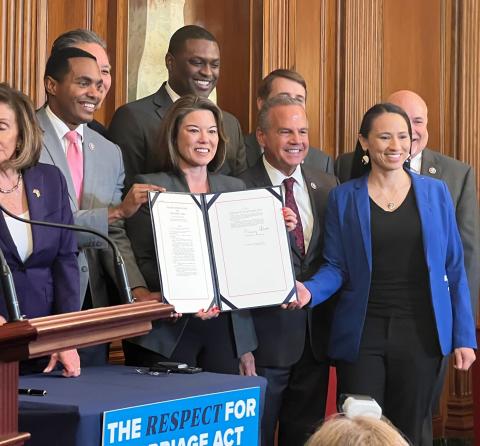Davids’ Bipartisan Bill to Protect LGBTQ+ and Interracial Marriages Signed Into Law
Davids joins President Biden at the White House for the signing of the Respect for Marriage Act
Today, Representative Sharice Davids was at the White House as her bipartisan Respect for Marriage Act, which enshrines marriage equality in federal law, was signed into law by President Biden. Davids joined her colleagues to introduce the Respect for Marriage Act in July following Justice Clarence Thomas' concurring opinion in Dobbs v. Jackson, in which he stated that the Supreme Court "should reconsider" previous rulings codifying same-sex marriage protections.
"Today, with the signing of the Respect for Marriage Act, millions of Americans were reassured that our federal government will continue to respect and recognize their marriage, specifically those in LGBTQ+ and interracial partnerships," said Davids. "While the Dobbs decision called our individual freedoms into question, this new law ensures Americans can marry who they love, no matter what the Supreme Court may decide in the future. I was proud to help introduce this bipartisan legislation and will continue working so folks in Kansas and across the entire country have equal protection under the law."

Rep. Sharice Davids joins President Biden at the White House to sign the bipartisan Respect for Marriage Act into law. Photo credit: The Salt Lake Tribune
The Respect for Marriage Act:
- Repeals DOMA. The Supreme Court effectively rendered DOMA inactive with its landmark decisions in United States v. Windsor and Obergefell v. Hodges, but it did not repeal it, meaning the unconstitutional and discriminatory law still officially remained on the books. With passage of the Respect for Marriage Act, DOMA will finally be repealed.
- Enshrines Marriage Equality for Federal Law Purposes. The Respect for Marriage Act requires, for federal law purposes, that an individual be considered married if the marriage was valid in the state where it was performed, even if that state is not where the individual lives permanently. This gives same sex and interracial couples additional certainty that they will enjoy their Constitutional right to equal treatment under federal law—regardless of where they live.
- Provides Additional Legal Protections from Individuals Seeking to Undermine Marriage Equality While Acting Under Color of State Law. The bill prohibits any person acting under color of state law from denying full faith and credit to an out-of-state marriage based on the sex, race, ethnicity or national origin of the individuals in the marriage, provides the Attorney General with the authority to pursue enforcement actions, and creates a private right of action for any individual harmed by a violation of this provision.